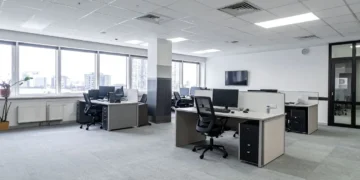- The health crisis is hitting the flexible space industry, and operators are feeling the pinch.
- Many operators are now in conversation with their landlords to try and reduce costs over the next few months.
- In a webinar hosted by GCUC, Giovanni Palavicini, a real estate strategist, shared insights on how flexible workspace operators can approach their landlords.
The COVID-19 outbreak has disrupted industries across the globe. The real estate industry is no exception, and landlords and occupiers will both be significantly impacted.
Already, investors, property owners, and property developers are expecting a dramatic pause in leasing activity. Existing tenants, for their part, are hoping landlords will provide rent-free periods and delay evictions.
How will this impact the flexible workspace industry? More importantly, is there anything flexible workspace operators can do to work with landlords?
GCUC recently hosted a webinar on how to have the right conversation with your landlord. During the webinar, Giovanni Palavicini, a real estate strategist, shared insights on how flexible workspace operators can approach and talk to their landlords.
Here are the highlights of the webinar.
“The key is to get to someone who can make a real decision,” Palavicini said. While some operators don’t have a direct relationship with their landlord, this is the time to start working on it, as your broker or manager may not be able to make a final decision or negotiate with you.
However, before you reach out to your landlord, Palavicini says that you need to know your numbers and be prepared to show your books. Operators could also benefit from researching their landlord and knowing who they are and how they are structured.
“This is an emotional time for everyone. But keep in mind that feelings are real, yet not reliable; landlords will want the facts and having your business numbers will show them where you stand and how you plan to get over this.”
In other words, flexible workspace operators need to have a strategy in place of how they are preparing for the future.
It should be noted that some operators may be in a better position to negotiate than others.
For example, International Workplace Group (IWG) reached out to its UK landlords asking for a three-month rent freeze in exchange for extending its lease for three months.
IWG is a large company, and more importantly, it’s profitable. In other words, IWG has leverage, which smaller flexible workspace operators don’t.
Many flexible workspace operators are not yet profitable, which may make it harder for them to convince landlords to give them a rent freeze, delay evictions, or provide any other type of help.
Palavicini told webinar attendees that “this is not a get out of jail free card.” Flexible workspace operators need to have a sustainable business and be transparent, otherwise landlords are not likely to want to help them out.
Following the webinar, Allwork.Space spoke with Scott Harmon, Founder of Swivel, to talk about how landlords are responding to the pandemic.
“It’s a chaotic time for everyone.
“However, I believe landlords will do their best to work with their tenants. But they will need to make a judgement, and they will make that judgement based on the stability of their tenants.”
Harmon states that landlords usually cannot go a month or two before moving to eviction procedures. “Landlords don’t have a lot of equity, they mostly borrow money and if they go too long without rent, then their lenders could repossess the buildings.”
This is why landlords cannot give forbearance to everyone.
Harmon believes that “if a business is likely to recover after this storm, the landlord will want to negotiate with them. If, on the other hand, a business is already struggling or will have a hard time recovering — whether it’s because the business is young or they don’t have a lot of runway — then the landlord might choose to evict.”
The good news for occupiers is that landlords, in general, don’t want to see their tenants go away, particularly as they may find it hard in the coming months to fill the space.
“I think their desire is to keep tenants in place, so we are likely to see a lot of renegotiation going on in the coming days and months.”
Harmon believes that we will see an increase in ‘blend and extend’ amendments. This basically means that landlords will extend current leases and negotiate a new rate with tenants. In the case of IWG, the blend and extend was a rent-freeze in exchange for a longer lease.
In the end, landlords understand that this is a crisis and that they and their tenants are in the same boat.
Harmon, however, gave a word of caution to flexible workspace operators.
“They may suffer from the WeWork fall; everyone followed that. Landlords are aware of what happened and many have turned more skeptical of the flexible workspace model.” Operators hoping to get help from their landlord will need to assuage fears and doubts about the sustainability of their business.



 Dr. Gleb Tsipursky – The Office Whisperer
Dr. Gleb Tsipursky – The Office Whisperer Nirit Cohen – WorkFutures
Nirit Cohen – WorkFutures Angela Howard – Culture Expert
Angela Howard – Culture Expert Drew Jones – Design & Innovation
Drew Jones – Design & Innovation Jonathan Price – CRE & Flex Expert
Jonathan Price – CRE & Flex Expert













